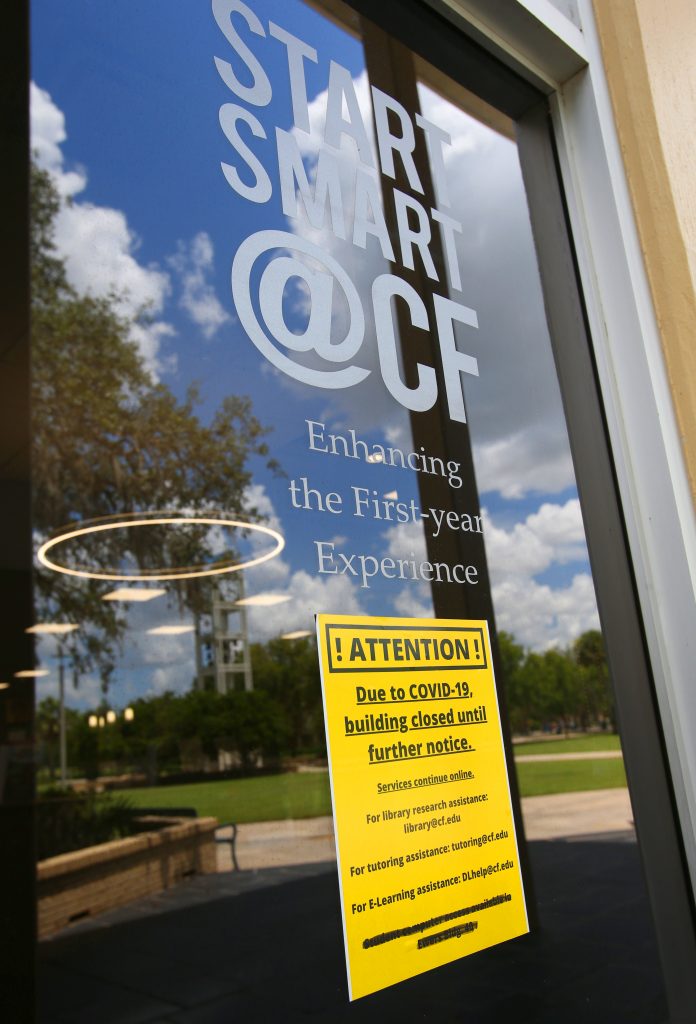CF coping and changing in midst of pandemic

A sign stating that that library was closed due to COVID-19 is shown posted on a door of the library on an empty College of Central Florida campus in Ocala, Fla. on Tuesday, June 30, 2020. [Bruce Ackerman/Ocala Gazette] 2020.
While plans to open the College of Central Florida’s Ocala campus to all students this week have been put on hold due to the resurgent coronavirus, college President Jim Henningsen says coping and changing in the face of crisis has been both positive and transformative for the school.
With about 95 percent of CF’s students currently taking their classes online, Henningsen said the college had originally planned to open all of its classroom buildings and other facilities on July 6. But because of soaring coronavirus numbers throughout the state, the campus re-opening has been moved to Aug. 3.
Despite the postponement, Henningsen said the college has weathered the past four months better than he expected.
When asked if he was surprised by how well students and faculty handled the changes forced by the pandemic, he responded: “Surprised? I would say shocked. I was shocked at how well it worked. We went from 36 percent online to 95 percent online in 10 days.”
“We’re using this as an opportunity to transform ourselves,” he added. “Hybrid is the way our faculty members like to think of it.”
To help smooth the way for the transformation, the college received $5 million in federal Coronavirus Aid, Relief, and Economic Security Act (CARES) funding, money that was evenly split between the college and students who are receiving financial aid. The college used its $2.5 million share to upgrade its computer systems, adding such things as Zoom, Labster and additional IT people.
Once the pandemic has passed, Henningsen believes that online learning will continue to be the mode the majority of students choose. He expects 50 percent to 60 percent of students to continue taking classes online once normality returns.
“Students like online,” he said. “Those are the first classes to fill up …
“There’s a lot of positives we’ve learned from this. I was worried about engaging, but we engage more now than we did before this.”
For all Henningsen’s upbeat assessments, he also is worried about the year ahead. Heading into the fall term, he said projections show that there could be a 20 percent decline in the current enrollment of about 10,000 full- and part-time students. If that were to happen, the lost tuition revenue would amount to about $2 million.
Such a fiscal setback would be felt, considering CF has added an array of programs for the coming year, including dental hygiene, paramedic to nurse, surgical tech, medical stenography, cardiovascular tech and additional nursing slots. Those additions cost about $3 million a year. That essentially ate up any budget funding gains CF has seen over the past five years. CF has a $40.7 million budget.
“I’m hoping students are just waiting until the end and will sign up late,” he said. “’Don’t pause your education.’ That’s the message I’m trying to convey. You can take your classes in a safe environment and you can still get a high-quality education.”
“But we’re hearing from students that they’re deciding whether to take a year off because of the pandemic.”
Nevertheless, if large numbers of students do stay home this fall, the college should be OK financially, Henningsen said, because CF has amassed a contingency fund that should take it through any enrollment dip and more pandemic-related expenses.
“We’ve built a contingency that can help us withstand a pretty bad storm.”
Regardless, the CF president said the college will continue to be a good higher educational option for students.
“We’re still going to be the hometown college with a national reputation with a vibrant on-campus life.”





